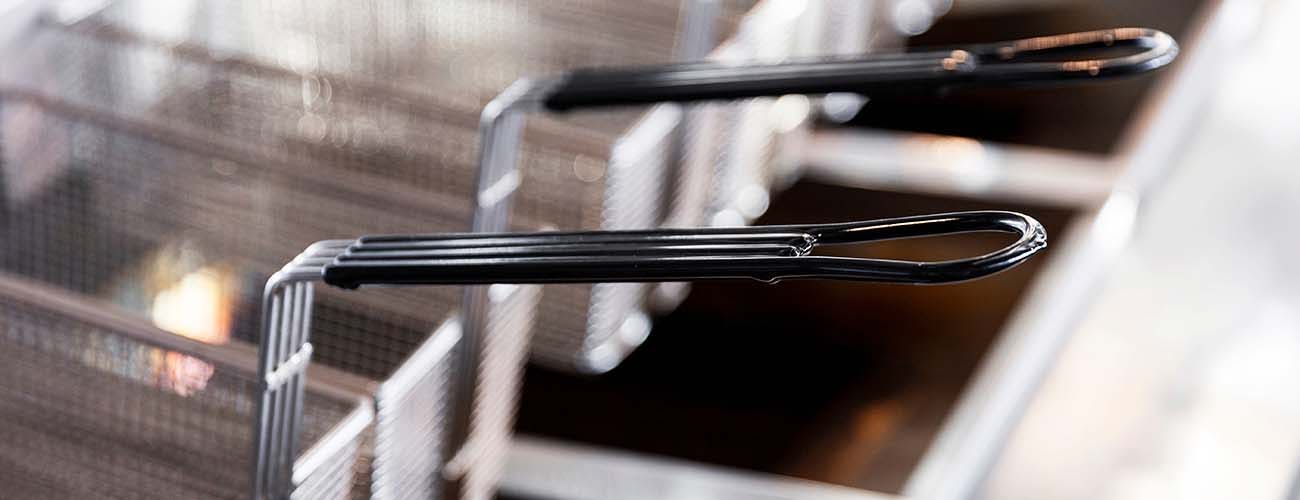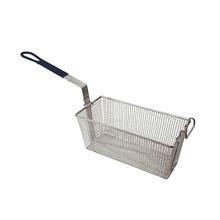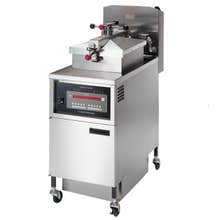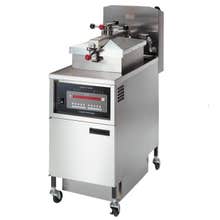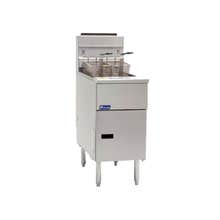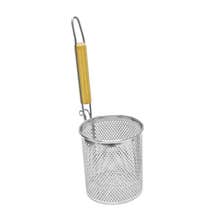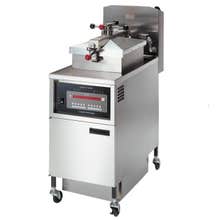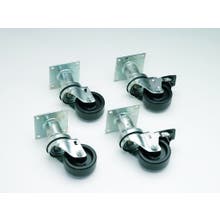How to Choose the Best Commercial Deep Fryer for Your Kitchen
By: Restaurant Equippers • May 30, 2024 • 7 minute read time
How to Choose the Best Commercial Deep Fryer for Your Kitchen
Deep fryers are essential for any commercial kitchen, offering versatile cooking options for various foods. Whether you run a bustling restaurant, a cozy bar, a catering service, or any other food service establishment, choosing the right fryer can enhance your kitchen's efficiency and output. This guide will help you navigate the different types of deep fryers and their features, ensuring you make an informed decision.
Types of Deep Fryers
Open Pot Fryers
Open-pot fryers are very common fryers and are ideal for frying low-sediment items like fries and frozen food. The fryer tank has a V-shaped bottom that creates an easy-to-clean cool sediment zone, making them versatile for various frying needs.
- Cook Times: Efficient for large batches.
- Oil Used: Can use any standard frying oil.
- Capacity: Varies, usually between 35-80 lbs.
- Heat Up: Quick.
- Cool Down: Moderate.
- Cleaning: Easy, thanks to the open design.
Tube Style Fryers
Tube-style fryers are a very common type of deep fryer. They have heating tubes running through the oil, which helps heat large volumes of oil quickly. They are great for heavily breaded items and high-volume frying.
- Cook Times: Typically fast, as the oil heats evenly.
- Oil Used: Suitable for all types of frying oils.
- Capacity: Typically larger, from 35-80 lbs.
- Heat Up: Quick, due to direct heat transfer.
- Cool Down: Moderate to slow.
- Cleaning: More complex tubes need thorough cleaning to prevent buildup. The tubes can make it difficult to reach the sediment zone.
Flat Bottom Fryers
Flat-bottom fryers are perfect for delicate items that may float, such as donuts, funnel cakes, or tempura. They have a flat heating surface at the bottom.
- Cook Times: Variable, depending on item size and oil volume.
- Oil Used: Any frying oil.
- Capacity: Generally smaller, around 15-40 lbs.
- Heat Up: Slower than tube or open pot.
- Cool Down: Faster due to less oil.
- Cleaning: Easier, as there are fewer nooks for debris to hide.
Types of Fryers by Design
Countertop Fryers
Countertop fryers are compact and ideal for kitchens with limited space or for lower-volume frying needs.
- Best For: Small restaurants, concession stands, cafes, bars, and food trucks.
- Capacity: 15-30 lbs.
- Advantages: Space-saving, portable, and typically less expensive.
- Considerations: Limited capacity may not be suitable for high-volume needs.
Floor Fryers
Floor fryers are larger, high-capacity fryers designed for high-volume use.
- Best For: Busy restaurants, hotels, catering services, and large institutions.
- Capacity: 35-80 lbs or more.
- Advantages: Higher output, more robust construction, and often more features.
- Considerations: Require more space and a higher upfront investment.
Pressure Fryers
Pressure fryers cook food under pressure, which helps retain moisture and flavor, ideal for fried chicken.
- Best For: Restaurants specializing in fried chicken and fast food outlets.
- Capacity: 10-60 lbs.
- Advantages: Faster cooking times, juicier results.
- Considerations: More expensive and complex to operate and clean.
Ventless Fryers
Ventless fryers are equipped with built-in filtration systems that remove the need for external ventilation.
- Best For: Locations without proper ventilation systems, such as food trucks or temporary setups.
- Capacity: 10-30 lbs.
- Advantages: Flexibility in placement, no need for additional ventilation.
- Considerations: Typically more expensive, filters need regular maintenance.
Air Fryers
Air fryers use hot air circulation to cook food, offering a healthier alternative to traditional frying.
- Best For: Health-conscious kitchens, small cafes, and households.
- Advantages: Uses little to no oil, easy to clean.
- Considerations: Limited capacity, different cooking texture compared to oil frying.
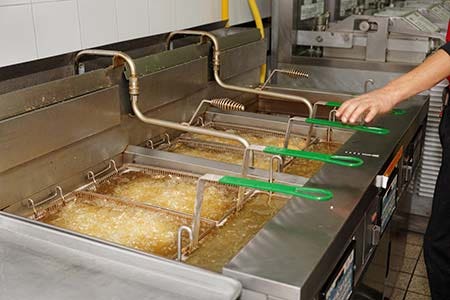

Fryer Accessories
Fry Baskets and Scoops
Fry baskets and scoops are essential for safely lowering and removing food from the fryer.
Fry Baskets:
- Types: Single, double, round.
- Best For: Ensuring even cooking and easy removal of food.
Scoops:
- Types: Solid, perforated.
- Best For: Scooping food without spilling oil, useful for large batch frying.
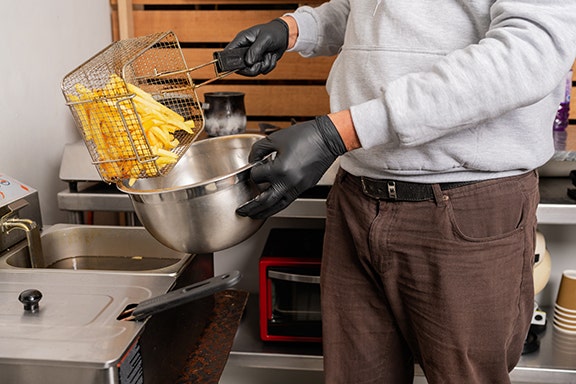

Choosing the Right Fryer for Your Needs
For Bars and Small Cafes
- Recommended: Countertop fryers.
- Reason: Space-efficient, sufficient for low to medium volume.
For Restaurants and Catering Services
- Recommended: Floor fryers or pressure fryers.
- Reason: High capacity, robust performance, suitable for high-volume frying.
For Food Trucks and Temporary Setups
- Recommended: Ventless fryers or countertop fryers.
- Reason: Flexibility in placement, no need for external ventilation.
For Health-Conscious Establishments
- Recommended: Air fryers.
- Reason: Healthier cooking method, easy maintenance.
For Large Institutions (Schools, Hospitals, Hotels)
- Recommended: Floor fryers with high capacity.
- Reason: Can handle large volumes of food efficiently.
Maintenance and Cleaning Tips
Proper maintenance and cleaning are crucial for the longevity and performance of your fryer.
- Daily Cleaning: Filter the oil and clean the baskets and surfaces.
- Weekly Cleaning: Perform a more thorough cleaning, including the heating elements.
- Monthly Maintenance: Check the oil quality, inspect for wear and tear, and deep clean the fryer.

